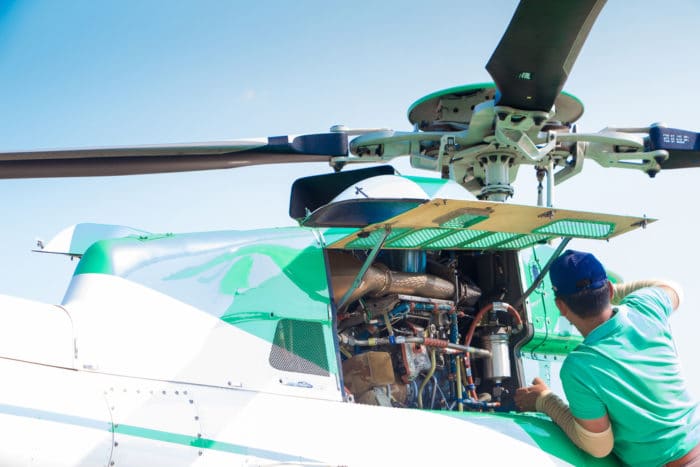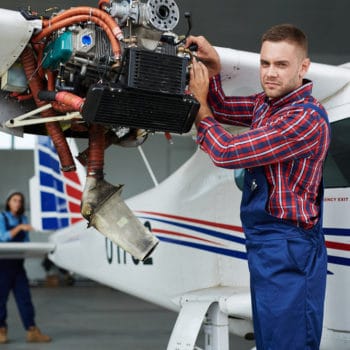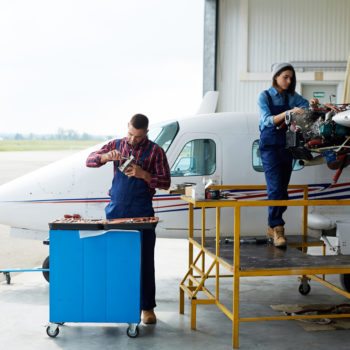Why We Love It
-
$60,160Potential Avg. Salary
-
1.3%Job Growth Rate
-
Growing DemandJob Outlook
-
Fast Paced CareerCareer Attribute
A helicopter mechanic is primarily responsible for maintaining different helicopters so they are safe and ready to fly. He or she has to have comprehensive technical expertise on aircraft structure, landing gear, helicopter surfaces and controls, etc.
Recommended Schools
What is a Helicopter Mechanic?
Duties
Helicopter mechanics enjoy job opportunities all over the world, and have the following job duties:
- Read and accurately interpret manufacturers’ and helicopter’s maintenance manuals, service bulletins, engineering or technical data and other documents for repairing malfunctioning parts.
- Remove and install helicopter subsystem assemblies like rotors, engines, transmissions and mechanical flight controls.
- Maintains records of the work performed on each helicopter and ensure the work was performed correctly.
- Adjusts, replaces and fixes the electrical wiring system and other aircraft accessories.
- Complete all assigned work in compliance with company maintenance processes and FARs.
Day In The Life
On a day-to-day basis, you will maintain and repair mechanical and avionic equipment to keep helicopters operating efficiently. You can spend your day completing assigned work such as inspections and repairs of structural and electronic parts of the helicopter, replacing elements, assessing wear and tear, etc. You will utilize a wide range of diagnostic equipment including computers and mechanical tools (i.e. lifts, hammers, punches, metal cutters), to assess the functionality of helicopters, as required by the Federal Aviation Administration (FAA).
In addition, solving moderate to complex problems will be done by correctly interpreting any technical documentation like blueprints or manufacturer’s manuals. Helicopter mechanics have to be comfortable climbing on and under helicopters based on the type of repairs needed. Since there are multiple deadlines, one has to also be efficient in prioritizing the workload and maintaining schedules on assigned projects. When tasks require coordination, you will have to transfer the relevant technical knowledge to less qualified personnel in easy to understand oral or written communications.
Work Schedule And Typical Hours
Experienced helicopter mechanics work 40 hours during the week, with eight hour shifts around the clock. An entry-level candidate will often have to balance sporadic schedules and work overtime. Occasional travel maybe required based on the company – working offshore as well as onshore at customer locations. You might also have to undertake repairs and maintenance jobs overnight or on weekend shifts. Work typically is outdoors in all types of weather like rain, wind, snow, etc.
Growth Of The Job
Helicopter mechanic jobs are on the rise, with an expected increase of 6% between 2010 to 2020 as per the US Bureau of Labour Statistics. Air travel is also increasing in frequency, leading to higher demand for aviation mechanics in the industry. Candidates who keep up-to-date with advances in aircraft electronics will find the most promising positions through their career.
Typical Employers
You can find employment with the military such as the US army, helicopter design and manufacturing companies, air medical industry, government business organizations, international development agencies and more. Some examples are AECOM, Columbia Helicopters, PAE, Unical MRO, Air Methods, Lockheed Martin, UTC Aerospace Systems and Life Flight Network.
Recommended Schools
How To Become a Helicopter Mechanic
To find employment in this job sector, you have to successfully complete a certified training program through the FAA. You can either get a certification as an airframe mechanic or as a power-plant mechanic. To qualify, you must have had 18 months’ work experience for one type of certification. In case you are considering the combined power-plant and mechanics certificate, you will have to have 30 months of experience.
Going to an aviation maintenance technology school certified by FAA is a great way to gain the foundational skills required. Such schools offer at least 1900 hours of coursework for applicants who are studying for combined certification, while only 1140 hours are necessary for those getting a certification in either power-plant or airframe maintenance.
A bachelor’s degree is becoming more of a priority for many employers, in either aviation maintenance management, aviation tech or avionics. Possessing an advanced degree will help you acquire a higher-paying job than other competitors. Besides academic qualifications, you should have certain skills that will complement this career path.
Having attention to detail is a must, since helicopters need to be maintained adhering to specific standards and precision. You have to excel with tight deadlines and superior technical skills to read gauges, understand instrumentation or diagnostic equipment when monitoring helicopters for repairs or routine maintenance. Working independently without technical supervision to perform all tasks listed in the Interactive Maintenance Manual (IETM) is expected of employees in this line of work.
Helicopter Mechanic Salary Data
We’ve provided you the following to learn more about this career. The salary and growth data on this page comes from recently published Bureau of Labor Statistics data while the recommendations and editorial content are based on our research.
National Anual Salary
Low Range
$46,720Average
$60,160High Range
$89,050National Hourly Wage
Low Range
$22/hrAverage
$29/hrHigh Range
$43/hrHow do Helicopter Mechanic salaries stack up to other jobs across the country? Based on the latest jobs data nationwide, Helicopter Mechanic's can make an average annual salary of $60,160, or $29 per hour. On the lower end, they can make $46,720 or $22 per hour, perhaps when just starting out or based on the state you live in.
Salary Rankings And Facts
#268 Nationally for All Careers
Above Average Salary Nationally
Programs and Degrees
Here are the most common degrees for becoming a Helicopter Mechanic. a is usually recommended and specifically a degree or coursework that prepares you for the particular field, see below.
Highest Education Among Helicopter Mechanics
- 0.2% Doctorate
- 1.2% Masters
- 8.7% Bachelors
- 20.4% Associates
- 39.6% College
- 27.2% High School
- 2.7% Less than High School
Job Growth Projections and Forecast
2014 Total Jobs
119,9002024 Est. Jobs
121,500Job Growth Rate
1.3%Est. New Jobs
1,600How does Helicopter Mechanic job growth stack up to other jobs across the country? By 2024, there will be a change of 1,600 jobs for a total of 121,500 people employed in the career nationwide. This is a 1.3% change in growth over the next ten years, giving the career a growth rate nationwide of Above Average.
Growth Rankings And Facts
#570 Nationally for All Careers
Above Avg. Growth Nationally
What Companies Employ The Most Helicopter Mechanics
| Industry | Current Jobs | New Jobs Needed | % Increase |
|---|---|---|---|
| Support activities for air transportation | 34,100 | 2,800 | 3% |
| Scheduled air transportation | 26,000 | -800 | -1% |
| Aerospace product and parts manufacturing | 18,300 | -1,000 | -1% |





















